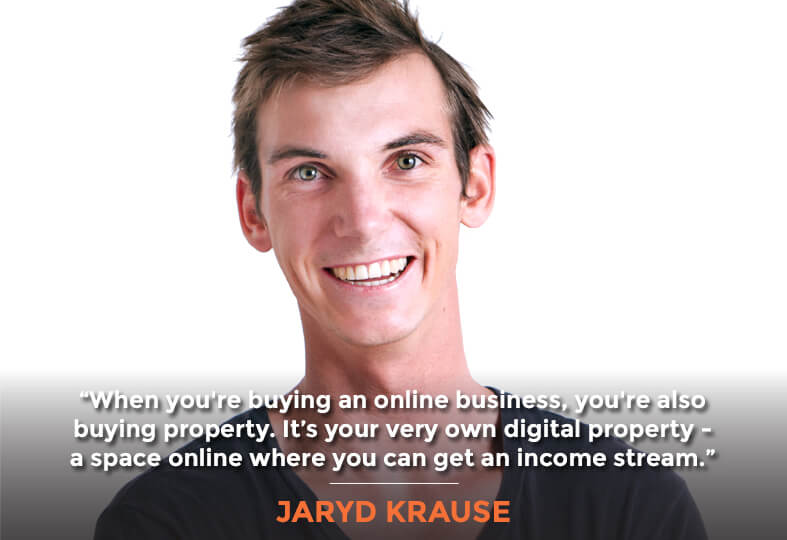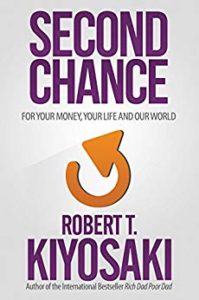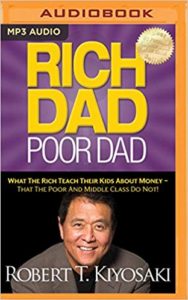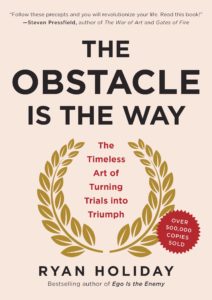It’s been so interesting seeing the world of buying and selling websites mature into something akin to real estate investing. And one of the leading minds in this space is my guest today, Jaryd Krause. Jaryd used to be a plumber working 60+ hours a week and hating it. Fast forward to today and he now owns multiple online businesses himself, and many of his clients earn thousands to tens of thousands of dollars per month from their business that they bought working with Jaryd. His Buying Online Businesses Podcast is rated in the top five best passive income podcasts.
And in this episode, we get into a really interesting discussion about smart ways to dip your toe into the waters of investing in online businesses. We talked about everything from Freakonomics to aftermarket domains to due diligence and cheat sheets. Even if you’re not currently in the market to buy a website you’ll glean some valuable tips to help your current online business thrive. And now, on with the show.

In this Episode
- [00:25] – Stephan introduces Jaryd Krause, an ex-plumber who worked 60+ hours a week and hated it, who now owns multiple businesses.
- [04:20] – Stephan and Jaryd defines the difference between assets and liabilities. What are considered assets and liabilities in a person’s life?
- [07:05] – How does property management on websites work?
- [14:05] – Would Jaryd recommend going through a broker to buy a website?
- [20:15] – What are the criteria in looking for a good site broker?
- [25:30] – Jaryd explains the projection on returns when investing in online businesses.
- [29:55] – Can an investor buy a portfolio of sites at one time? Is building a PBN (Private Blog Network) advisable?
- [38:50] – How to distinguish an expired domain from an aftermarket domain.
- [49:10] – How to flip websites and sell them at a higher price.
- [52:45] – Where can people tune in to Jaryd’s podcast and get in touch with him?
Transcript
Jaryd, so great to have you on the show.
Thank you so much for having me, Stephan. I really appreciate our talks and I’m looking forward to this one.
We just did some interviews for your show and for your virtual summit, so that was a lot of fun and thank you for having me as a guest expert. I’m curious, where do you see this heading because I think the economy is kind of in trouble. Probably, heading towards a recession and so forth. And people are getting more careful about their investments, they’re going to invest in something they understand vs. don’t understand if they’re not really that savvy with online businesses.
Does that mean that the market’s going to dry up for the buying and selling of online businesses, or do you think that this is the future, like this is the new real estate, and we’re just going to see this ramp up massively? What’s your take on all that?
That’s a great question and to be honest, I do see this as the new real estate. I relate a lot of what buying a website is to buying real estate. Now, what most people do not realize is that when you’re buying property or buying physical property, you’re buying land. When you’re buying an online business, you’re also buying property, that you’re buying digital property, you’re buying yourself space online where you can get an income stream. The cool thing about it, most people don’t even know this, this industry is evolving or even exists.
I was speaking to the CEO of Flippa just last week, and we’re talking about how a lot of people go out and buy a car for $10,000, $20,000, $30,000 or $50,000. I often say to people, “When you buy a car, how much do you spend?” They tell me the price and then I ask them, “Okay cool, so how much money does that car make you?” It’s often the cost of the money, it’s a liability.
I also tell them like, “Look, for the same price as a car, you could buy a website business,” and the entry to get your foot in the door is a lot easier compared to buying physical property. The way I see this is the multiples are only rising for online businesses at the moment and it really is a seller’s market, so if you have a website and you want to sell, there’s an abundance of people who want to buy them.

That’s why I see this still growing. I do hear, see, keep my finger on the pulse with the big R (recession) word, and it’s being drawn out for a long time. I know Robert Kiyosaki. I’ve actually got his book, The Second Chance. He wrote that back in 2016 when I read it, and it’s being drawn out.
I also held back from buying businesses in that year, and then I thought maybe I’ll buy another one, and so I did. I’m glad I did because I’ve got my full 100% return on my investment back from that and it’s still growing. If a recession happens, I’m okay with that. It makes the entry point even cheaper for me and for everybody else.
Speaking of Robert Kiyosaki, the book he’s most famous for his Rich Dad Poor Dad and in that book he describes or defines an asset is something that puts money in your pocket every month and a liability is something that takes money out of your pocket every month. That house that you live in and you’re paying a mortgage on is a liability, because it’s taking money out of your pocket every month. If you have a house that is a rental property, you rent out, you’re the landlord, now that’s an asset.

That’s a very powerful distinction because this would apply to online properties as well. If you have a property that is taking money out of your pocket every month, that is a liability, it’s just an online liability. “Oh, I’ve got this website and it’s just kind of a showpiece for me, my services, my speaking and all that.” If that’s not actually generating any income for you, that is a liability. You need to turn that into an income source and make it an asset then.
It’s such a good point. I think it’s scary because I’ve grown up with the same as what the American dream is over here in Australia. The Australian dream is to grow up, buy a house, get a car, get everything sorted out, but it’s all on credit. There is one thing about good debt and one thing about bad debt.
Robert Kiyosaki talked about this a lot as well, and when you buy a house or you buy something with debt or finance, normally you’d want that to bring in more income than what the finance repayments are, but when you buy something like a house, it’s a liability and it ends up being not the best type of debt really. So it’s a great point.
But then there’s this concept of OPM, other people’s money, so if I can buy five properties, real estate, or online properties that are mostly other people’s money, but I have a stake in it, that might be worth a lot more to me in the long term, than me just using all of my liquid assets and making them illiquid, buying that property, and not using any debt or other people’s money.
The cool thing about using other people’s money is that if you control that asset and it’s making an income, they just give you some money and it’s completely passive for them, where they get a return, which is really cool. That’s where I’m heading in the space as well. I’m going down and setting up those types of investments and helping people fund sites and stuff like that. It’s an exciting thing, it’s an ever-growing industry now, and some big things that come from it. So I’m pretty excited about it.
There’s a niche in this space that’s occupied by companies, like the now-defunct Income Store, that they make it a lot easier for the investor or the potential website owner to buy a website and operate it because they don’t have to be an expert in everything, from SEO, to eCommerce, to analytics and email marketing and social media marketing and pay-per-click, all of it. They manage all that, but then they take half of the income every month and they take half of the sale price once it sells. You as the site partner own the property, but you have essentially a management firm.
You don’t want to repair the toilets of the various renters’ places, so you hire a property management company to take care of that for you, and they get paid every month. But in this case, the incentives are more aligned because it’s in their best interest, and in yours as the site partner, to grow that asset. Just pretty cool and a pretty unique business model. Do you know of any other companies that are doing it this way?
When you're buying an online business, you're also buying property. It’s your very own digital property - a space online where you can get an income stream. Share on XThere’s quite a few. There’s probably about a handful now that are doing it, maybe just under 10 that I’d know of, and it’s becoming more of a common practice. Say, somebody’s going to come and invest with our fund we’re setting up. It’s the same as what a lot of people are offering is they can put the money into the pool, we can buy a site, we’ll take a management fee out of it, and then if they’re going to sell it within a certain time frame, usually within under 12 months, we’re still eligible to take half the sell price as well.
It would be in our best interest to grow in a short time frame to get a part of that selling price, and then also with the main owner, who’s got the biggest stake in the businesses, it’s in their best interest for us to grow in a quicker time frame, so I can get in and out, buy another one, and grow another one.
It’s like when you’re flipping houses. It’s so relatable to a property because if people want to buy a rundown house, they can buy a rundown website as well. They come in and renovate it, do it up, flip it in 6–12 months, and make a lot more money because they added much more value to it. That’s what a lot of people are doing with websites, too. It’s just a lower entry point. When you go to buy a house for between $200,000–$500,000, you could do this with a $50,000–$150,000 website.
Is there a certain sweet spot for the price of a website? Are we talking mostly $50,000–$150,000? Can you buy a pretty decent website for $20,000–$30,000? Or are the best ones really in $500,000 and up price point? Where is the sweet spot in your view?
I like to always stick to you-get-what-you-pay-for. A lot of people come to me, and they might have saved up over the years, saved up $10,000–$20,000, you’re not going to get the same quality of business if you spend up to sort of $50,000 on your first website. Anything over $50,000 mainly towards $100,000, it’s a lot easier because it’s more established. I like to see people buy sites, if they’re a beginner, between $50,000–$250,000. If they’ve got a little bit more money, buy something between $250,000–$500,000 because that’s where you end up having more time for yourself and you can be a CEO, an investor rather than be an operator. Most people who get into the space want to do this to have a better lifestyle.
You can achieve your goals a lot quicker if you do have those finances or if you use OPM, and you could get finance like an SBA loan, which is quite common now. With all my clients, I have a lot of brokers that I push people towards, and they get help setting up finances and stuff like that. There are different ways you can finance this, but I prefer people to buy something in between $100,000 and $150,000 and $500,000 range because it just makes it a bit of a lifestyle.
That makes sense. If you’re going to buy a house, you don’t want to buy a house for $20,000–$50,000. You’ll end up in a really bad place and in a very bad neighborhood. You got to be realistic about what a legit online business is going to be worth. What sort of valuations do you typically see or do you recommend?
It depends on how micro and macro we go with this, but we’ll stay very macro. It’s similar to an offline business at the moment where you’re getting about a three-year multiple, or 36. They do it in months with websites as well, a 36-month multiple. That also depends on the business model.
There are some business models that have less risk such as subscription- or membership-type sites, where there’s a recurring income coming in, so you can buy yourself into recurring income. Normally, their multiples will be a bit higher. You might see them up around 3½–4, but other sites that may be really heavy reliant on something like a lot of ads spend, the multiples may be a bit lower.
I’ve had clients that have bought sites with a 10-month multiple, so less than one year multiple, and I’ve had clients that have bought them around three-month multiples. It does vary, but normally, it used to be 25%–30% return on investment per year, now it’s up around the three-year multiple, so it’s still roughly 25%–30%, it’s actually more percentage. Before, it’s like 30%–40%.
The industry is growing in a way where it’s a sellers’ market, so they can sell their businesses for a lot more and achieve a higher multiple for it because there are so many buyers. At the moment, you’d see roughly 25%–30% return on investment per year, which is when you look at real estate and you look at stocks, I mean the return is quite large compared.

A lot of people don’t know this exists, so when they go and see website brokers, and they can actually see how much the website costs, how much they’re making in revenue and income, what their expenses are. They can also see what work is required and how many hours are required to run that business as well. They can get a full scope of the business quite quickly, just by looking at each listing, like when somebody lists a property for sale, it’s the same as listing a website for sale. You can list on a website broker just like a real estate broker. That information is all there for everybody to go see.
Interesting. Would you recommend that somebody only go through a broker to buy a website or can they find opportunities on their own?
You can find opportunities on your own, it is a lot harder. There are marketplaces like Empire Flippers and Exchange Marketplace. You can come to these sites and buy sites directly from the seller, although a broker definitely plays a good role.
When you buy straight from a seller, normally they haven’t sold a site before, so they don’t know what sort of information they need to give you. They can be fumbling around, and it can be hard to extract that information and for you to do due diligence.
It also causes some people to be a bit anxious about, “Hey, this person hasn’t sold a business before, and they don’t know what they’re actually doing.” When they’re selling it, how do I have confidence in them knowing how to run their business as well?
You can pick it up for a low multiple if you want to go through that process. I did that myself with my first website business, and I quickly converted over to buying from brokers because brokers have all the information. They play a very good role in this. Normally, what I see is the better listings are from brokers.
Okay, got it. What are brokers typically earning in terms of that transaction? Is it 10%? 20%? How does that relate to a realtor?
It’s cooler than it seems because a lot of people get real estate. It’s very similar. It depends on the price. If somebody is selling a $500,000 site, they’re going to get a little bit less commission than selling a $50,000 site. Selling something around $50,000 they may be between 10%-15%. I don’t know anybody that’s doing 20%. You can also go up to as minimal as 7%. Some of them are listing businesses for $30 million. This is where bigger funds and pooling of money come in together to buy those via $30 million, $10 million, $20 million, $30 million, $40 million businesses. They get a much smaller percentage on that and it may be 2%-5%. It depends on the size of the business, but yeah, you get anywhere from 2%-15%.
Okay. I had an interview with Chuck Mullins awhile back who does some work for Quiet Light Brokerage. He’s a serial entrepreneur. He would buy a bunch of websites, he’d sell websites, and so forth. He started working with Quiet Light quite a lot, and then he decided he liked them enough that he would work with them. That was a pretty interesting interview. He talked about some of the benefits of working with a broker, the due diligence that’s required, how they do some of that, and what some of the things are to look out for. Some of those gotchas where you could end up getting scammed if you’re not careful. It was a great interview. Listeners, if you check out that episode, I think that’ll be worth your time.
I’m curious. Besides Quiet Light Brokerage, which I’ve heard good things about, are there others that you would recommend, that you’ve used in the past, or your clients have used? I know it’s hard to pick favorites because somebody’s not listed as one of your favorites and then, “Okay, I thought we were friends.” I’m not asking you to pick favorites.
It is hard because I know a lot of people in the space and a lot of brokers with my clients buying from a vast array of brokers. I have been on the Quiet Light Brokerage Podcast myself before. They’re very good. You’ve also got Digital Exits. You’ve got Empire Flippers and FE International. They’re two of the go-to brokers that we normally bought from. I just had a client who’s finished up with a $500,000 listing with FE International. Last month, we bought through Empire Flippers. I bought it through Empire. Those are the two go-to brokers.
We also definitely look at Digital Exits and Quiet Light. Some different brokers have different price brackets of sites. You may have someone that’s just selling sites from $1 million-$20 million, and for the person who’s just getting in, it’s not a viable option for them straight away.
I’ve met some people that are buying from Flipper and Exchange Marketplace because they are able to buy those sites that are between $10,000-$40,000. They know what’s involved, they know it’s going to be a little bit more work for them, but that’s where they’re prepared to get into and start really pulling out their sleeves. It does help to get into that startup operator, to at least learn about the online space, to then become a better CEO when you do buy bigger listings, but they would be my go-to brokers and marketplaces that people can go and check out.
People work with you not because they want your information. They work with you because they trust you. Share on XThey can just jump on Google and find them. Even if they Google website brokers, there’s going to be a bunch that will pop up. It’s really cool to see the listing price, how much they’re making per month, and how much it’s costing per month, and work out, “How long would it take me to make my 100% return investment back?” and then the wheel starts ticking and then you go, “Oh well, this may be something I need to get into.”
What have you heard about or experienced with Latona’s?
Latona’s I’ve looked at a lot of sites through them. Some of my sites, some of my clients have looked at a lot of sites through them. I’ve never gone on and bought through them. We’ve never pursued it just because we haven’t seen the business investments viable for each investor. Have you worked with them?
I haven’t, but I had some conversations with Tony, their founder, because he was looking for SEO, so he was considering hiring me and my company to help them with SEO.
I’ve had him on the podcast as well. They are very good. They’re good brokers, but we just haven’t picked up any from there yet.
What are some of the criteria that you would recommend a listener use when determining whether they’re going to use that particular broker or not? What are the strengths and weaknesses that they’re trying to gauge with these different brokers?
That’s a good question. I’m big on building relationships with people because it’s not about I’m going to buy one business. If you’re going to do this, you can do this for the long-term, and the more people that you can become friends with and not like a robot become friends, but actually be a good human being about it, then the easier it is for you to go through and buy businesses. A big criterion for me when you’re looking through brokers is, how easy is it for you to contact them and build a relationship with them. Stay in contact.
Also, are they listening to you? I know Empire Flippers. They have pre-calls with investors and say, “Hey, how much do you want to spend? What are you looking to get?” and they’ll actually go away and start putting businesses in front of them that are within that criteria. That’s another criteria I’m looking for a broker. Then, how much are they on the seller side as opposed to the buyer side. If they’re very in the middle, it’s very good.
My biggest thing would be building relationships and how easily they help you. The price range wouldn’t really be a big thing for me. When you’re buying a $150,000 site. Give and take a couple of thousand dollars isn’t a big thing. I’d rather have a better relationship with the broker and be more confident than trying to scrimp out on a couple of grand.
Yeah and also have them more aligned with your interests, too, if they’re more balanced in that regard. Just like if you’re working with a realtor, and they really want to unload this property, they’re representing the seller and it’s just not moving, not moving and, “Oh, we got a live one here. Let’s unload this property on you.” That could be bad having the online equivalent of that.
Yeah, especially for me. I’m pretty energetic when I see a good investment. I try my hardest to just be non-emotional about it. The same when somebody who is brand new to buying a website, I teach them how to become a very attractive and savvy buyer, where they’re investing without their emotions, and they’re relying on a lot of the logic.
Brokers can tell the difference when people are first-time investors and when they’re not. If you can get as much education behind you, which is what I do. I help people empower themselves to make the right decisions and go through the process the right way.
How many sites do you have in your portfolio currently?
I’ve got three in my portfolio at the moment. We’re looking at expanding in the New Year, which is exciting. I’m starting to look at some listings in the New Year and building this fund.
What does that look like? Like you’re getting OPM and you’re looking to acquire a bunch of different websites or just a few more? What does this fund look like?
It depends on how big you want your fund to be. You can buy a platform business and a platform business could be a lesser price than other businesses you may bolt on to the business as well. You can buy a platform business and add-on (or bolt-on business is what they call them), which helps grow that website. It’ll be either in the same niche or it will be similar, and it can help grow that platform business as well as the bolt-on business.
At the moment, we are looking for something that can be a platform with the addition to bolt-on. We’re not going to go super fast with it. We want to ensure that we’re doing the best we can with our team, growing and not splitting our focus too much but focusing on the first one that we buy, and ensure that our investors get a really good return. We’d rather work with that.
That would be the most important goal than just building something ridiculous because if you tarnish those relationships with the investors, that can cause a massive ripple effect. Some people’s ego can blind them from, “Hey, I want to be really big, really quick, and be seen as this type of fund,” or whatever. That’s not important. The people and the investors are important.
If we ensure that that’s our goal, then we’ll do well. We’re not going to try and do our first fund and raise $10 million. We’ve already got people that are coming to us with some funds, and we’re taking a bit of a list. It’s first a platform business and we’ll work from there, ensuring along the way that our investors get a good return. I want to stick with this long term, not just a 2-3 year thing, but 10-20 years.
Slow and steady wins the race. Also, think of the long game, too. I’m curious. What sort of returns are typical? I know this is a tough question to put in front of you because you don’t want to make any promises, and you don’t want to set up unrealistic expectations and then have disappointed investors for your fund, but I’m guessing there are other funds out there that you can invest in. What’s typical? What’s out there in the industry and the ranges of percentage returns per year?

It really depends. There are funds where you can invest with them, they will grow and manage the business, and they’ll take out a management fee, and give you a high return on your investment. Then there’s some that will just take a part of the income and then give you a part of the income. It depends on what the goal of that investment may be.
For example, say it’s a fund where they may buy it for the investor. They may have a goal of growing it within a year and flipping it. They may say, “All right cool. We’re going to grow it, and we’re going to take 10%-15% of the return per quarter or per month and give you the rest of the return. Then after that, if we sell the site within a year, we’ll take 50% of what we sell it for, and then you take 50% as well,” that can be an option.
Then you’ve got other funds that may just pay anywhere from 5%-15% per year. It can be continual and then compounding growth as well on top of that. You may get bonus growth per month or per quarter when the business grows or fluctuates, but you will have a base and a minimum. I’d love to answer that and be specific on what our fund is going to be and what others are, but they do vary, and it’s very dependent on what the investor is looking for as well.

And one thing they’ll look out for is, are your incentives and outcomes aligned with the person managing the fund? Or the broker, the consultants, the coach that you’re working with? I don’t know if you’ve read the book Freakonomics before, but it’s one of my favorite business books.
I saw SuperFreakonomics as well.
There’s this concept in the book that if there’s misalignment in the incentives, that’s where you end up with things like teachers cheating on their student’s behalf so that they don’t get fired for having poor-performing students, or sumo wrestlers that are throwing matches because there is an incentive for them to do that and stuff like that. You would be very surprised to hear it happens, but it’s just baked into the system. It’s just inevitable that that kind of cheating or working around the person they’re supposed to be helping, that’s baked into the system a lot of times.

It really is and this is why being fully upfront with your investors and not trying to just tell them one thing and do that thing, but also do a couple of other things around that thing. Coming back to go even deeper to that is for an investor, you just need to really sit down and go through that person’s content and have really good open conversations with them, and it comes back to trust.
A lot of people that work with me are not because they want my information. And same with you. They work with you because they have that trust. That’s the biggest thing. You want to find somebody that you want to invest with, that you actually trust. Go through and have conversations with people. Go through and check out their content, check out what they’re offering, and see if you like the feeling there in your gut and your intuition actually feels within alignment of what you actually want.
Maybe you’ll find a fund that will pay less of a return, but you have more confidence in. Just like what we’re talking about before. That’s a very good point and having that alignment.
I’m curious if there are opportunities to buy a portfolio of sites at a time. I didn’t know this until recent years, but you can buy a block of houses and pay as little as $10,000 or $20,000 per house because you’re buying a block of 10 or 20. Many of those are not houses you would want to own, but then there are some gems in there potentially that are worth a lot more. Does that happen in the online world?
It does. There can be sites that are selling for even $50,000, where you can buy 2-3 sites in 1, all the way up to bigger, $2–$20 million blocks or groups of websites that may be a platform with some bolt-on as well. It is common. The smaller ones are normally where you’re buying a site with the PBN bolted onto it, which isn’t something that I or yourself would completely suggest at all. Don’t do that, guys. If you see the word PBN, just a big red flag there.
Just think of the word termites.
Exactly. You’re not going to get a building and pest-check complete on that. There’s definitely group buys that you can buy them together. When somebody’s doing such a thing, I would suggest you’re going to do your research and due diligence in the way, but really posing the question of how valuable are these sites or this extra site to the growth of the main business and how is that going to play out in the future if we keep trying the way it is.
What are some of the things that a buyer of a site or blocks of sites would need to do or should do in terms of their due diligence?
There are a few main ones. You’ve got traffic, you want to check your traffic and all of your SEO. I try to keep traffic a bit separate from SEO. You want to make sure the traffic is turning up, or down, sideways, in which way and why. You want to know the demographic. Definitely traffic and then you got SEO. That can be on-page SEO, off-page SEO.
Then, you’ve got financials. You want to check the financials. You want to make sure that’s the income actually coming in and it’s the right income that I say is coming in. Cross-reference everything from the profit and loss statement to a screen share. You can get the viewer’s access to their business’ merchant account or their Shopify account.
It’s crucial to know what the risks are even before embarking on a business. There will always be risks in business but make sure they’re worth it. Share on XAlso, marketing. Checking out their marketing is a big part of the due diligence.
My favorite part of due diligence (and what I find is the most important) is one thing that people just don’t get right, and it’s the seller call. The seller call is when you get on the phone, you have a bunch of questions ready for the seller, and you just learn so much more about the business in that one call (that may be a half an hour to an hour call), than most of what you may have learned in the data that you’ve been given for the due diligence in the prospectus. They would be the main things to cover throughout your due diligence.
Do you have a cheat sheet of the best questions to ask during that seller call?
I do. I’ve got cheat sheets for all the different types of business models. It’s a part of what my community gets. I’ve also got a framework. I’ve got a due diligence framework which, for beginners, I can give for free if they want. You can just head to my site. It tells you eight parts of the due diligence and what questions you need to ask about the business. Not specific to the seller, but ask about what they need to know to ensure that they can get the right information throughout that due diligence.
You mentioned your community. What do your community members get on an ongoing basis or what sort of one-off resources are they going to definitely want to get, like that checklist of questions and things like that?
If people jump into the community, what they get is obviously the community, which is a network of people that are buying, growing, and selling sites. Five-, six-, seven-figure income owners in there. We got a good caliber of people. Let us say your network is your net worth. They get the community and you’ve also got the course and the content.
I created a course. It’s kind of a zero-to-hero course on how to buy a website. You get all that data, information, then training from me and other experts. The biggest drawcard is the support. People aren’t just buying the information. What they’re doing is they’re buying the support. Not just the support of the community, but the support of me. I do due diligence reviews.
It’s a massive drawcard. When they’ve done all the work and due diligence, I can come in and have a quick look at the business, do a quick review with them and say, “Maybe you need to ask this question or this may be a red flag. Find out this information.” Empower them to really buy the business themselves, but with just somebody watching over their shoulder.
That’s the main thing. I want to teach people to buy these websites, so they cannot just eat. Not just get somebody giving a fish and they can eat dinner for a night, but teach somebody to catch the fish, so they can eat dinner for the rest of their lifetime. That’s the principle of what I like to teach, so they can build their own portfolio. They don’t need to keep hiring me, they don’t need to keep working with me to do it in a long-term.
That’s my philosophy too with SEO. Is that I want to teach my clients how to fish, so that they can pull up a site and know what to look for. Like, “All right, let’s take a look at robots.txt file. Let’s look at the XML sitemaps. Let’s look at the different reports in Ahrefs, and SEMrush, and similar web,” all that sort of stuff. Diagnose and reverse engineer, what’s right and wrong with the SEO of this particular website. That website might be your own, it might be a competitor’s, or it might be a potential acquisition. It’s like having a superpower when you’re really good at that.
Yeah, because you do that audit, which is so valuable. When people learn from that audit and how to do that, it’s the best value you can give to somebody because it’s compounding value.
I’m curious. What is your take on aftermarket domains? There’s no website to go with it, it could have been some really sketchy website before, may have never been a website, just a parking page or the website doesn’t even resolve, and you’re buying the domain.
There are tons of websites out there where you could look at aftermarket domains like Afternic, Sedo, hugedomains.com, buydomains.com and so forth. Sometimes I’ll help my clients buy an aftermarket domain because it’s a really good potential brand name for them. There’s nothing that comes with it in terms of content, or the link equity is probably going to get reset to zero when you buy because Google is going to know. It’s really hard to fool Google into thinking that a site has a change in ownership, and probably doesn’t even have any link equity anyway because it was most likely a parking page for all those years. Tell me what your take is on aftermarket domains.

Wow, such a good question. We had this question come up in the group a couple of weeks ago. Somebody was looking at a site that was built on an expired domain. They had a lot of links going to the site still. I was very confused. Like you said, it should be refreshed. The links weren’t relevant, they weren’t relevant links. If Google sees this and they haven’t rectified it, it’s going to cause not the greatest SEO for the website.
I posed the question; I didn’t just tell them what to do. That’s not what I do. I don’t just go, “Hey, you should do this or don’t buy it.” I ask them the questions to empower them to really understand this is the right thing to do. I asked, “What you need to do to get rid of those links and to rebuild this back up to ground zero and build from there?” There was a lot of work required in doing that.
The next question was, how much would that cost? Adding that onto the investment that you are already going to pay, is it worthwhile doing that for the potential return that you’re going to make? The answer was no. In this case, it wasn’t the best investment to buy something that had been built on with an expired domain. I’d be much more confident with your help if you were helping myself or my client buy an expired domain. You’d have a far better audit than myself because you’d been in the space for a lot longer in the SEO, on auditing that actual expired domain. Yes, you can buy bad existing domains that aren’t going to be too beneficial and then you can also buy good ones. What’s your take on it?
I think it’s important to distinguish an expired domain from an aftermarket domain that hasn’t expired. If someone lets a domain expire, that’s a signal that Google is going to pick up on. They know that a lot of PBNs (private blog networks) are built up on expired domains. The hope is that the spammer, the blackout person is going to be able to reap some reward from that expired domains from all link equity that was acquired over time. Google’s desire to reset that page rank to zero so that they get no benefit from that. That’s a very different situation. You’re almost playing in a bad neighborhood there, with going after expired domains. It’s very challenging and it’s easy for Google to catch what’s going on.
Whereas an aftermarket domain, let’s say that the site has never changed ownership. It’s been sitting in some domainer’s portfolio for 10 years, they never got what they wanted for. They just held on to it, they have thousands of other domains, it’s not keeping them up at night, and then you finally come with an offer that they’re willing to accept.
How do I leverage any link equity that that aftermarket domain has? Probably it has none because it was just sitting in their portfolio with a parking page and who’s going to link to that? It was an expired domain, is probably a previous website that you’re hoping to fool Google into thinking that, “Oh no, those are my links. I earned those links.”
An aftermarket domain where you’re changing your brand name or you’re developing a brand, everything good is already taken, especially with .coms. Everything good is taken, so you’re going to have to pony up at least a thousand, several thousand dollars to get anything halfway decent. Occasionally, you’ll find something good for a lesser price point. Like I did buy, for example, scienceofseo.com for $600.
Cool. That’s a great one.
Yeah, and it did have an existing site on it, but nothing that I wanted to keep. I didn’t care about trying to retain any link equity to that previous site because it wasn’t that much, and I had other plans for it. If you think about which scenario you’re dealing with and what your endgame is, that’s going to inform your decision-making process. That’s my view on it.
That’s great to distinguish the two differences aftermarket and expired because you can say it’s quite easily a no-go zone. But the aftermarket, if one of my clients is going to go away and buy an aftermarket domain, I’ll be asking the question how link-worthy would that domain be? Like we’re talking about long before, is that something that is aligned with the core ethics, values, and morals of the business? Is it going to be the best domain to showcase what those ethics, morals, and values are that is going to create a more link with the domain?
Flipping sites can be like picking up a shell and adding monetization strategies into it. Who knows? Maybe you’d pick up a shell that’s worth $5000. Share on XI actually interviewed a domainer who focuses on expired domains, surprisingly, but has legitimate sites on them. He’s pouring over expired domain lists on a daily basis. It’s just part of his morning routine, like how some people read the newspaper. He’s reading expired domain lists and stuff, and he’s picked up some good ones. A couple of his online businesses now like dailyonions.com is a site he owns. He picked up, I believe as an expired domain. duderanch.com or duderanches.com, one or the other, I forget which one is his as well. He built up a bedandbreakfast.com but for dude ranches at that site. He’s got a pretty cool story. If you wanted to check out that episode listeners, it’s Peter Askew.
I now want to go into the area of let’s say that you want to find a diamond in the rough. The site owner has some challenge that they’re facing at the moment, the best of kind real estate property, for example, that you could buy as one where you’re buying it from a don’t wanter. That’s a term from Robert Allen, from Bob Allen, who is also on this podcast.
He talks about the don’t wanters. They don’t want to have that property anymore. They can’t afford it anymore, or they’ve outgrown it, or they’ve downsized in emptiness. There’s some reason why they don’t want it. I guess that property itself is called the don’t wanter. You’re looking for these don’t wanters. There’s a reason why it’s got to come off their books. You just get off of their asset sheet.
If you’ll think of the online equivalent to that, there must be millions of websites where they’re going through a health challenge, a death in the family, maybe they got laid off, or some financial issue, they got an immediate need for money for whatever reason. Something happened and they need to unload the property, but they don’t know where to turn, they don’t know about brokers, they don’t know the first thing about this whole industry, and you just happen to be the first one to knock on the door.
One technique that I learned about from a real estate person (it wasn’t Bob but somebody else), who said that he calls up folks that are listing places for rent in the newspapers or on online sites. If the place keeps showing up week after week, that’s a good sign that it could be a don’t wanter because they can’t fill that place with another renter. That’s probably pretty stressful. They’re relieved to get a call. “Oh my God! You want to rent my place? That’s awesome!” “Actually, no. I don’t want to rent it, but would you be willing to sell it?” That might catch him off guard, but you’d be surprised, some people will entertain that. If you could be the only person they’re talking to because they haven’t started thinking about using a broker or a real estate agent, that’s a great opportunity, right?
It’s a massive opportunity. It’s something I’d definitely teach my clients as well is that you can go for off-market opportunities and there are specific ways that you can contact them, so to see that, “Hey, I may be interested.” It’s more of a passion buying a business that’s your dream business because you can go off-market deals, you can poach anyone or any business, and if it’s something like, “Hey, I’m obsessed with surfing. I love this, look at this website. I’ve been following it for a while. Maybe I’ll just contact them and start building a relationship around that and see if they want to buy them.”
Back to your question about the don’t wanters, there are so many ways to find opportunities on these don’t wanters. I’ve had people that have wanted to sell websites. A kid wanted to sell his site, so he could afford to go to college. Then I’ve had people with health problems, want to sell sites, so they could get their surgery and all that sort of stuff.
When you buy a site like that, you’re actually doing that person a service. No matter what that need is, you’re actually helping them get what they want, which is important, too. You’re actually filling in this gap here and then when you do take it over, those things that you can do or opportunities you can see. For me, I certainly see a plethora of things. For me, it’s working out what should I push away, not distract myself with, and what should I focus on mostly.
A lot of the times we see things that email lists aren’t touched and haven’t been contacted in a long time, but they’ve got a good list. That’s free marketing. Everybody’s listings are in the market. That’s free marketing for a list hasn’t been touched. Do you know email marketing? Massive opportunity.
Then, you’ve also got things like if you’re really good at marketing, on Facebook ads, YouTube, Google ads, whatever it is, you may see the marketing profile and say, “I could do some of these types of things or this person doesn’t even have a pixel on their website, and they’re not doing any remarketing or been in carts.” Things like that.
Same with SEO, Stephan. When you come in and look at a site and you’re like, “All I need to do is to link detox and a little bit of this sort of stuff, a few tweaks, and I could reap this massive growth opportunity.” Actually, in my community, sometimes I’ll go through and look at websites and lists for sale. I’ll do a screen share and just share 20 things on each site that I could do to improve it and grow it. Then, tell them also what the risks are, and then weigh it up. Is it worth getting those opportunities with those risks there involved? That’s one of the things I love to see in businesses, like how can I build this?
What online businesses are telling us is that aside from working hard, we all have to work smart as well. Share on XRight, like if you look at a content site and you think, “Wow. This is in a topic area that I’m really passionate about. I think that this website owner is in that situation where they have a don’t wanter, they need to move on.” There’s so much opportunity to grow the traffic or to monetize. Maybe they aren’t monetizing at all. There’s not even Google AdSense on the site. They’re not using Mediavine or AdThrive, or they don’t have any affiliate links on the site. You say, “Wow. This is a great content site that I could just slide in all these monetization opportunities and start making immediate cash from it, and they’re probably making nothing off of it, so maybe I could get it for a very good price,” because what’s the multiple of zero, right?
Exactly. You basically are picking up a shell and putting some monetization strategies into it. That’s a good flip-it strategy, you could pick it up. Who knows? Maybe I would pick up a shell for like $5000. And it could be less. I wouldn’t go too low because there will be more red flags or problems they could be involved with. But you can pick something up for $5000, put some good affiliate articles in and throw up some AdSense that isn’t a hindrance to the viewer. Over a year, you might scale some income, then you put it back on the market and sell it for $30,000. Probably more, $40,000.
Or you buy a content site that’s a bigger one that is somebody’s main focus, maybe it’s $50,000 and then you grow it to $400,000 because they haven’t done a very good job with monetization, SEO or what have you.

Yeah. This is the big thing with the people that don’t want us as well. They make it their website to a certain level of growth that they can achieve (because they’ve only grown themselves a certain level), and they may hit a wall of resistance in personal or business growth. A lot of people do that. We’re always faced with these little obstacles like my favorite book is The Obstacle Is the Way. Some people may not want to push through that threshold.
With that, people used to go, “I give up. I don’t want it. Put it on sale.” Then, there’s somebody that comes along, such as yourself, myself, or either of our clients will go, “This is an opportunity.” They have been already passed that wall of that person hasn’t broken yet, and they can just take advantage of that opportunity.
Do you have any kind of special tools or did you build anything internal? Any kind of algorithm or whatever that will help you find these don’t wanters or these diamonds in the rough?
I don’t have any specific software built, no. I do have little SOPs. Little processes that people can do. The first is really setting up. I hope people find out what their goals and guidelines are. It’s really important for people to understand what they really want because I’ve bought businesses before where I’m like, “This isn’t really something that’s going to help me achieve the goals that I want or it’s not within my guidelines,” and I just got overwhelmed by, “Oh, this is making all this awesome money. I want to be the owner.”
I really take people back to ground zero and say, “What are your goals and guidelines? You got to have financial and lifestyle goals. Then create some guidelines, so you have 5–6 guidelines of what the website would be. Then, you can go out and find these ones that are the don’t wanters, that are aligned with that.”
I have a little Excel process sheet where people can rate the business from 1-10, according to things like do you have finance for it? Is that the business model that you want? All these little different things that can allow it to be scored from a 0 to a 10, and then if it gets high enough, like a 7, then they can proceed in doing a deeper dive into due diligence. So, it’s not a piece of software, but those are few tools that I have built out that people can use.
Very cool. How does somebody join your community, take your courses, and maybe even get to work with you one-on-one?
The first thing people like to see is to check out my podcast, so they can really listen to me, be bored like, “Oh, is this Jaryd guy trustworthy or not?” Listen to me and see if I’m the person that can actually help you. Go to my website, buyingonlinebusinesses.com/community. You can check out what is in the community and how it all works. I speak to all my guys when they do due diligence, reviews, and all that sort of stuff. And have a good time.
Awesome. Thank you so much, Jaryd, this was great. You have some really deep knowledge in this area of buying and selling online businesses. I’m sure that our listeners have gotten some great tips from this. Thank you so much. Listeners, take this knowledge and apply it. Grow your business to the point where it’s worthy of being sold, buy a business, or work with brokers to do both even. We’ll catch you on the next episode of Marketing Speak. This is your host, Stephan Spencer, signing off.
Important Links
- Jaryd Krause
- Twitter – Jaryd Krause
- Facebook – Jaryd Krause
- Youtube – Jaryd Krause
- LinkedIn – Jaryd Krause
- Buying Online Businesses Podcast
- The Second Chance
- Rich Dad Poor Dad
- Freakonomics
- SuperFreakonomics
- The Obstacle Is the Way
- Chuck Mullins – previous episode
- Peter Askew – previous episode
- Bob Allen – previous episode
- Robert Kiyosaki
- Empire Flippers
- Flippa
- Exchange Marketplace
- Quiet Light Brokerage
Your Checklist of Actions to Take










About Jaryd Krause
 Jaryd Krause used to be a plumber working 60+ hours per week and hated it. Fast forward to today and he now owns multiple online businesses himself and many of his clients earn thousands to tens of thousands of dollars per month from their business they bought working with Jaryd. His Buying Online Businesses Podcast is rated in the top 5 best passive income podcasts online.
Jaryd Krause used to be a plumber working 60+ hours per week and hated it. Fast forward to today and he now owns multiple online businesses himself and many of his clients earn thousands to tens of thousands of dollars per month from their business they bought working with Jaryd. His Buying Online Businesses Podcast is rated in the top 5 best passive income podcasts online.







Leave a Reply